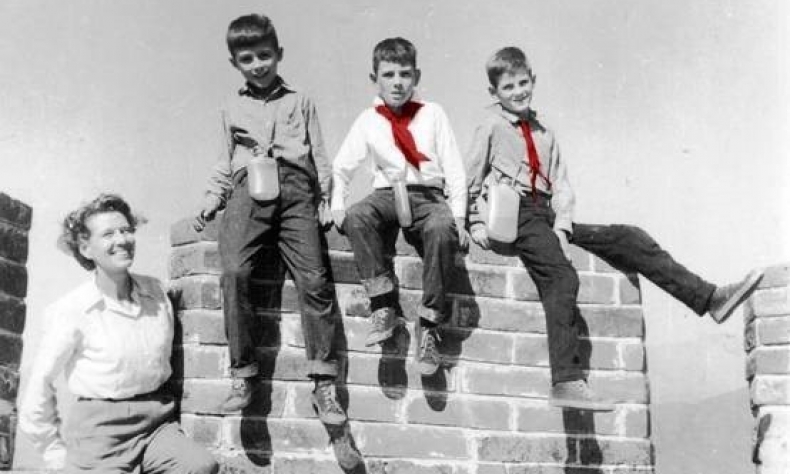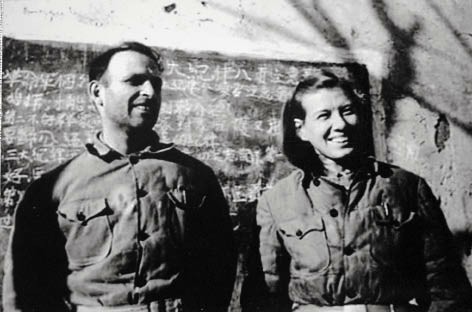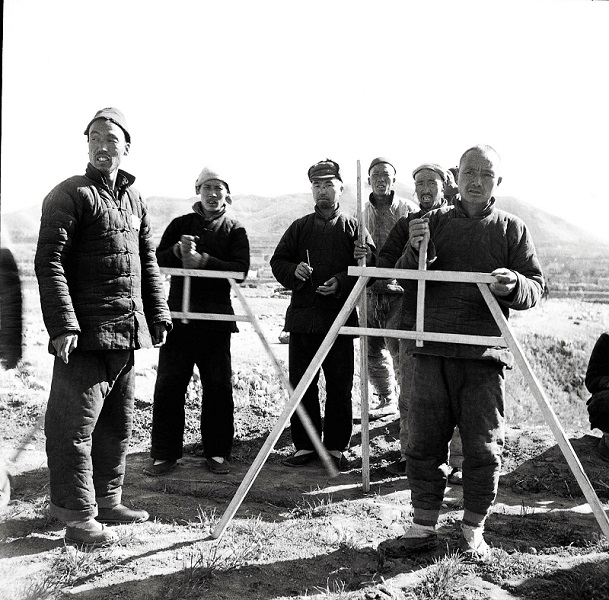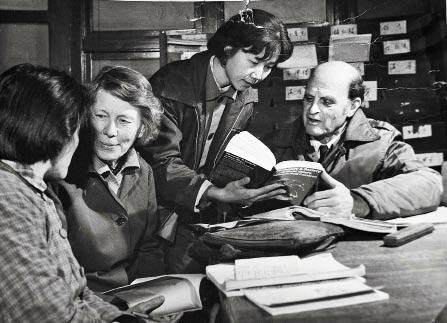A Family’s Century-Old Bond with China

We have seen China gradually develop from a war-torn, poor and weak country into a peaceful country, with one of the most important economies in the world, and now China strives to create a more peaceful and harmonious world for the entire humankind.
Michael Crook, 70, is a British man who was born in Beijing. He speaks fluent Chinese, yet is able to switch to English with ease.
“Having grown up in Beijing, I am familiar with the Chinese revolutionary stories,” he said. Currently, Crook wears many hats – chairman of the International Committee for the Promotion of Chinese Industrial Cooperatives (ICCIC), director of Beijing Bailie University, and co-founder of the Western Academy of Beijing (WAB). In 2004, he received the Chinese Government Friendship Award, presented by the Chinese government to foreign experts who have made an outstanding contribution to China’s modernization, reform, and opening-up.

A Historic Choice
Like many foreigners who have chosen to work and live in Beijing, the Crook family has established a deep and lasting bond with China. However, in their case, the bond goes back an entire century. His mother, 106-year-old Isabel Crook, is a Canadian who lives on the campus of Beijing Foreign Studies University (BFSU). On the 70th anniversary of the founding of the People’s Republic of China in 2019, Isabel was awarded the Friendship Medal – the highest honor in China for foreigners.
In 1915, Isabel was born into a missionary family in Chengdu, capital city of southwest China’s Sichuan Province, and spent her youth there. Her parents cared much about China’s rural areas and established kindergartens and primary schools in Chengdu, which had a profound impact on young Isabel, who later devoted herself to education and social research in rural China. In 1938, 23-year-old Isabel obtained a master’s degree in Canada and commenced anthropological studies in today’s Aba Tibetan and Qiang Autonomous Prefecture in Sichuan.
Michael said that the love story of his parents – David Crook (1910-2000) and Isabel Crook was intertwined with the history of the Communist Party of China (CPC). In the 1930s, the Chinese people were taking up arms against Japanese aggressors. David was then a British communist. He often wondered what CPC members looked like, and why hundreds of thousands of Chinese risked their lives to join the CPC and the Red Army, the predecessor of the People’s Liberation Army. In 1937, Red Star over China, written by American journalist Edgar Snow, was published in the U.K., causing a sensation in the country. It also aroused David’s curiosity about China and made him decide to go and see what it looked like with his own eyes.
“My father read the book about the heroic feats of the CPC and the victory of the 12,500-kilometer Long March (1934-1936). He became fascinated with China,” recalled Michael. “In 1938, he came to China and decided to stay in this amazing land.”
It was in Chengdu that David met his beloved Isabel. Sharing the same interest in China, the two young people fell in love and got married two years later.
“From my mother, my father had a chance to learn more about rural China; my mother became a firm communist thanks to my father,” said Michael. In 1947, the couple ventured to the liberated areas led by the CPC and conducted a six-month in-depth investigation on the land reform taking place in Shilidian Village, Hebei Province. Via their field study, an important stage of China’s new democratic revolution was recorded in an authentic way and two books of great sociological value were completed: Revolution in a Chinese Village: Ten Mile Inn and Mass Movement in a Chinese Village: Ten Mile Inn.
Having lived in China’s rural areas for a long time, Isabel realized that the CPC was the inevitable choice of the Chinese people. “At that time, the Kuomintang (KMT) was also carrying out a rural reconstruction movement, but the progressive reform they advocated could not fundamentally solve the problem for farmers. In the end, the CPC’s land reform policy materialized and land to the tiller became a reality,” Michael recalled his mother’s words.

Widespread Support
“During the War of Resistance Against Japanese Aggression (1937-1945), a large number of international friends came to China and worked on the front line to support the Chinese people in various areas, including education and health. Among them were the Canadian doctor Norman Bethune, American doctor George Hatem, German doctor Hans Miller, and New Zealand-born educator and cooperative worker Rewi Alley, who was also the founder of the ICCIC,” said Michael, the current chairman of the organization, noting that the Chinese people’s liberation and salvation movement, led by the CPC, had received widespread support across the globe.
According to Michael, the ICCIC was first established in Hong Kong in 1939 by Madam Soong Ching Ling, Rewi Alley, and others. The Gung Ho Movement organized laid-off workers and refugees displaced by the Japanese invasion to set up manufacturing cooperatives in aid of China’s resistance effort. Gung Ho, from the Chinese Gong He, is short for Gongye Hezuo, meaning industrial cooperation, or working together. Since that time, men and women within China and beyond have dedicated their lives to helping China’s poor move out of poverty by working together.
Afterwards, Alley moved to Shuangshipu, then a small town with a population of less than 2,000 in northwest China’s Shaanxi Province. There, he founded an industrial cooperative and the Bailie Technical School, with his British friend George Hogg, by making use of the crucial location of Shuangshipu as a transit hub linking Shaanxi, Gansu, and Sichuan, and a mineral storage site rich in coal and iron ore. Today, the small town has already developed into a town of 20,000 people.
“At that time, Shuangshipu was economically backward, with no electricity and few shops. The establishment of a large number of cooperatives not only brought vitality to the town, but also promoted its industrial development,” said Michael. He added that Alley met Chairman Mao Zedong twice between 1939 and 1941, and was encouraged by Mao to establish industrial cooperatives in northwest China. After that, much international aid was offered to the liberated regions, which helped to promote the industrial production and construction there.
“ICCIC made an outstanding contribution to supporting the Chinese people’s War of Resistance Against Japanese Aggression with large amounts of overseas aid,” said Michael. The Gung Ho Movement had both men and women members from within China and beyond, including both CPC members and KMT patriots, thus forming the most widespread front engaged in seeking international aid, and producing military and civilian supplies to support the resistance against Japanese invaders. Finally, with the support of the CPC, a mass production movement was formed, which helped tens of millions of unemployed workers and refugees and made a great contribution to the War of Resistance Against Japanese Aggression.
Today, Michael hopes that every member of the ICCIC demonstrates the spirit of “work hard and work together,” set by its founder Rewi Alley. The spirit was mentioned in President Xi’s letter to the ICCIC in 2017. He also urged the members to continue to contribute to the cause of poverty reduction, equal rights for all, and humanitarian aid.
When the COVID-19 pandemic broke out and was raging worldwide last year, ICCIC raised prevention supplies via its four liaison offices in China, dispatched them to designated hospitals, and offered a helping hand to severely affected areas in Europe and the United States. Isabel herself donated RMB 10,000 to Chengdu Second People’s Hospital where she was born. Meanwhile, Michael made a short video, telling the historical stories of Wuhan to an international audience. In the video, he narrated several historical events that took place in Wuhan, including the Wuchang Uprising in 1911, the founding of the Wuhan Nationalist Government in 1927, the establishment of the Chinese Industrial Cooperation “Gung Ho” organization in 1938, and the completion of the first bridge across the Yangtze River in 1957. “People will have a biased view of Wuhan if they only learn about it through the coronavirus. I want people around the world to learn more about its history and remember this heroic city of Wuhan,” said Michael.

Construction and Development
For Isabel, it was the CPC that brought peace to the Chinese people; while for the generation of her son, the CPC has brought development. After the founding of the People’s Republic of China in 1949, many international friends who came to China and supported the Chinese people’s resistance against Japanese invaders chose to stay and devoted themselves to the post-war recovery and reconstruction work.
In 1948, at the invitation of the CPC, Isabel and her husband David went to a village called Nanhaishan in the west of Shijiazhuang, capital city of Hebei Province, to establish the Central School of Foreign Affairs, where they started their English teaching career in a shabby adobe house. The school has since developed into the current BFSU, and the couple became pioneers in new China’s English teaching, spending the rest of their lives in English education. They trained many high-caliber professionals, who are now active in various fields, such as diplomacy, education, and journalism. On the BFSU’s east campus, students erected a bronze bust of David Crook, engraved with a line of Chinese characters: Friend of the Chinese People.
Isabel has been living at BFSU for more than six decades. Her apartment is decorated like many elderly Chinese people’s homes, with portraits of Mao Zedong and Zhou Enlai on the walls, and bookshelves fully loaded with both Chinese and English books. It is clear that she has a deeper knowledge of China and its contemporary history than many Chinese. From a young girl to a grey-haired lady, from an anthropologist to an educator, she has experienced China’s vicissitudes in the 20th century, including warlords’ melees, the War of Resistance Against Japanese Aggression, the War of Liberation, and the founding of the People’s Republic of China, as well as the reform and opening-up. In her eyes, she was fortunate enough to participate in the building of socialism, and that experience has made her life rich and intriguing.
For Michael, although he has left China many times, he always returned to Beijing, where he has spent the longest time of his life – about 50-plus years. In the early 1990s, with the rapid development of China’s economy, myriads of international organizations, Western media outlets, and multinational companies settled in Beijing, with an increasing number of foreigners working and living in this capital city. So in 1994, Michael helped found an international school — the WAB — along with his friends. Since then, he has dedicated himself to exploring the best practices of international education with Chinese features. Introducing Chinese culture to an international audience is also one of his ideals.
For the Crook family, Beijing seems to have a powerful magic. Maybe it is because the city undergoes constant change, which always makes people wonder what will happen next in the nation’s capital. Michael said, “My family and I have an indissoluble bond with China. We have seen China gradually develop from a war-torn, poor and weak country into a peaceful country, with one of the most important economies in the world, and now China strives to create a more peaceful and harmonious world for the entire humankind.”
 Facebook
Facebook
 Twitter
Twitter
 Linkedin
Linkedin
 Google +
Google +










